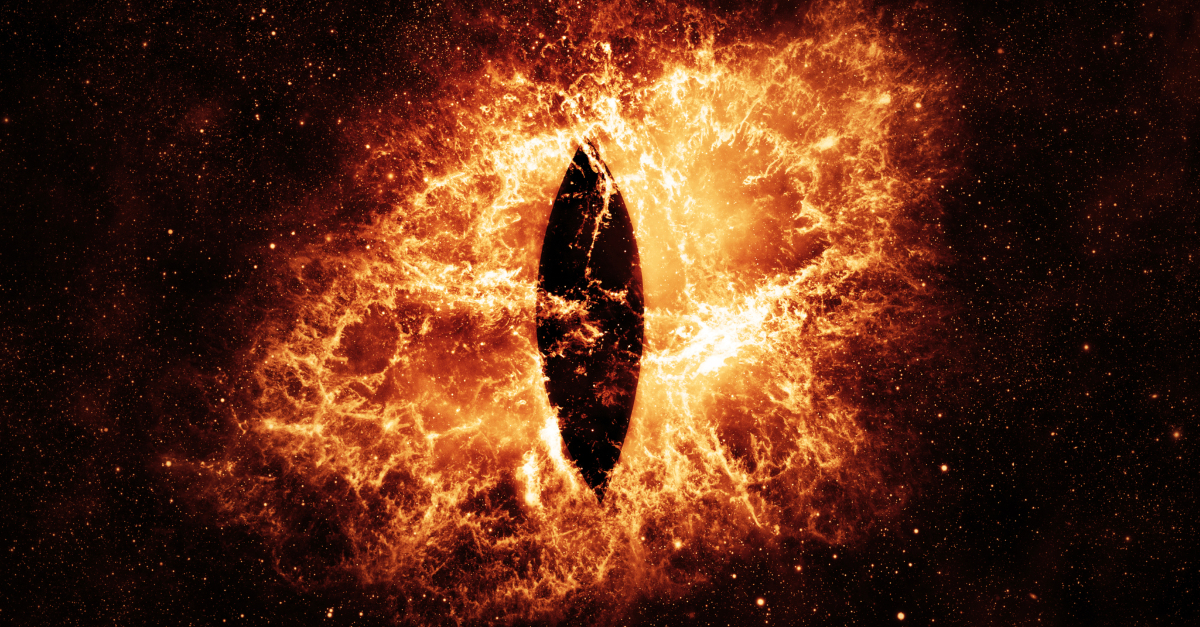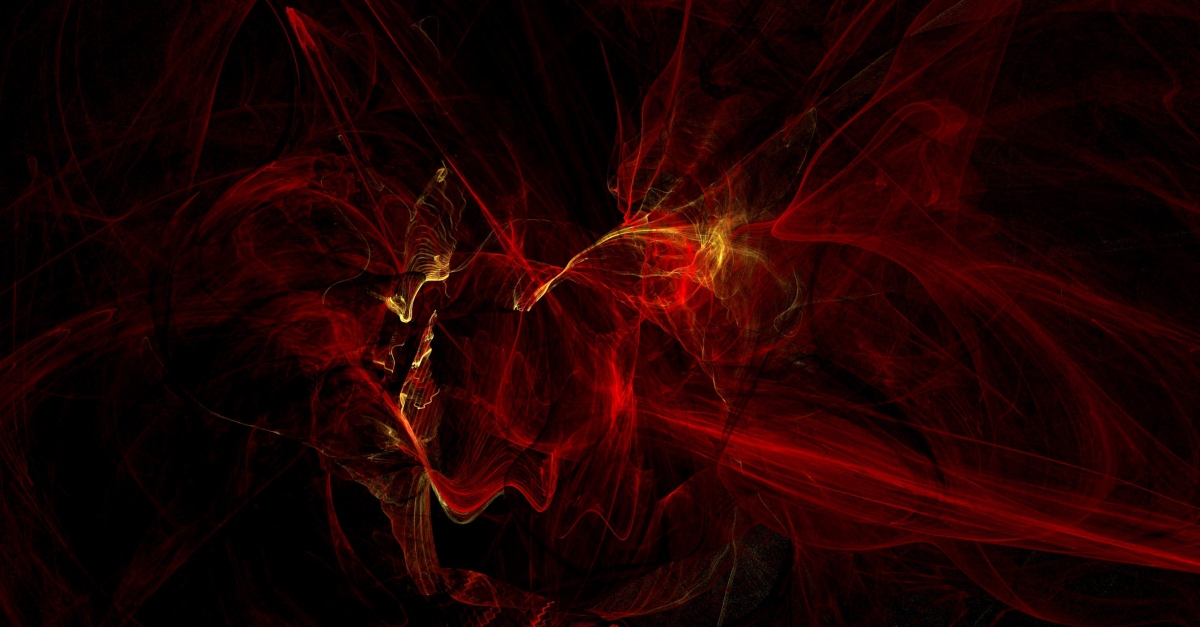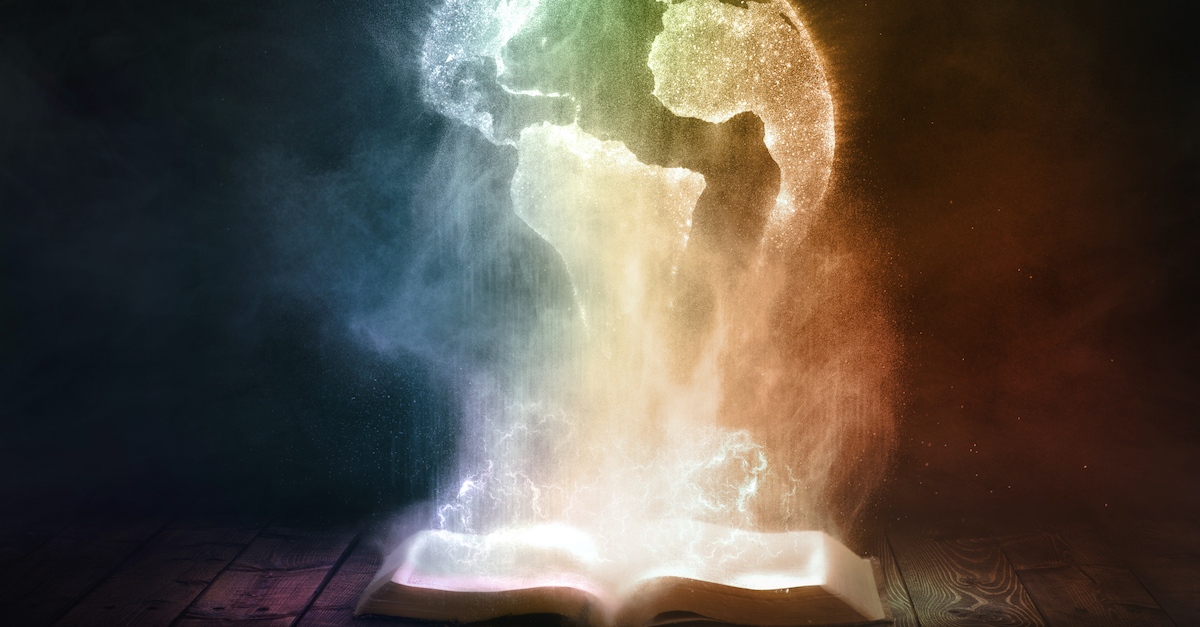
Then another sign appeared in heaven: an enormous red dragon with seven heads and ten horns and seven crowns on its heads. – Rev. 12:3
The book of Revelation is filled with odd and confusing symbols. Scholars have attempted to decode John’s apocryphal vision in Revelation for thousands of years, with varying levels of success—after all, while on Earth, Jesus stated that even the angels did not know everything about what would happen, only the Father did (Matthew 24:36).
Instead, these symbols are often there more to teach us something than to give us a blueprint for exactly what will happen. One of the most fascinating symbols is that of the seven-headed dragon. What does it represent? What do the passages mean?
The seven-headed dragon, according to John, is Satan. Below, we will explore what the Bible says about the dragon, what the dragon does, and the dragon’s ultimate fate.
Photo Credit: ©Getty Images/Aphelleon
Where the Seven-Headed Dragon Is Found in the Bible

We first learn of the seven-headed dragon in Revelation 12. Revelation 12:3 says, “Then another sign appeared in heaven: an enormous red dragon with seven heads and ten horns and seven crowns on its heads.”
The dragon then becomes a recurring character in Revelation. Revelation 12 details the dragon’s exploits attempting to lead a rebellion against God and attempting to destroy a mysterious woman and child. Revelation 13 tells of the dragon falling in league with two other beasts to deceive the world.
In Revelation 20, things go downhill for the dragon, and it is cast into the abyss for a thousand years. It is temporarily released before its final defeat and it is thrown in the lake of fire.
Who Is the Seven-Headed Dragon?
Revelation 12:9 says, “The great dragon was hurled down—that ancient serpent called the devil, or Satan, who leads the whole world astray.” Revelation 20:2 also says, “He seized the dragon, that ancient serpent, who is the devil, or Satan, and bound him for a thousand years.”
The seven-headed dragon in Revelation represents Satan. This doesn’t mean that Satan is a literal dragon; the seven heads, ten horns, and seven crowns are symbolic.
A horn, in the Bible, is a symbol of power or strength. Thus, the dragon is powerful. The ten horns also harken back to Daniel’s vision in Daniel 7.
A head is a sign of power or authority, and this creature has seven of them.
Crowns are a symbol of kingship; Satan is attempting to set himself up as a king in opposition to God.
The Greek word that is translated to “dragon” here is “drakon,” and doesn’t exactly fit our modern imagery of a dragon. The drakon in Greek was understood as a type of mythological serpent—referring directly back to the serpent (Hebrew “nachash”) in the garden of Eden who deceived Adam and Eve (Genesis 3).
Photo Credit: ©SparrowStock
The Seven-Headed Dragon in Revelation 12 and Revelation 13

Revelation 12, when the dragon is introduced, gives a bit of a background on the history of the dragon and God’s people.
Revelation 12:1 introduces a woman wearing a crown of twelve stars, representing the twelve tribes of Israel. The woman is pregnant, and the child is understood to be Jesus, who came from the line of Israel. The woman is not a literal woman; she is called a “sign,” and women are used multiple times to represent religious systems in Revelation.
Revelation 12:3-4, when the dragon is introduced, gives some background on the dragon. It states that the dragon swept a third of the stars out of the sky and flung them to earth. The dragon stands in wait for the woman to deliver the child—to devour it.
The “third of the stars” referred to here is usually understood as referring to the angelic host, a third of which, it is believed, followed Satan in his rebellion (and thus became demonic forces).
However, Satan fails to devour Jesus in Revelation 12:5-6.
In Revelation 12:7-9, war breaks out between Satan and his demons and Michael and the host of angels. Satan loses and is hurled down to earth. He proceeds to attack the woman again, but she is delivered (Revelation 12:13-16).
He then turns his sights to the believers: “Then the dragon was enraged at the woman and went off to wage war against the rest of her offspring—those who keep God’s commands and hold fast their testimony about Jesus” (Revelation 12:17).
Revelation 12 summarizes, in allegorical form, the history of Satan’s attacks against Israel, his plots against Jesus, and his failure in both regards. Now, we are prepared for Revelation 13, which records what Satan will do in the end times.
In Revelation 13, a beast rises up out of the sea, and the dragon gives it his throne and great authority (Revelation 13:2). This beast is typically understood to be the Antichrist. People worship the dragon and the beast (Revelation 13:4). This is a symbolic portrayal of a future time.
Another beast rises up, a beast who acts as a sort of prophet or priest for the first beast and performs signs and wonders (Revelation 13:11-18). This beast is also known as the false prophet (e.g. Revelation 20:10).
Between the dragon, the beast, and the false prophet, Revelation 13 shows that Satan will create a sort of unholy trinity in opposition to the true Trinity.
Photo Credit: ©Getty Images/claudiodivizia
What Happens to the Dragon with Seven Heads?

After several chapters about the desolation wrought by this evil alliance and the destruction poured out on earth, Revelation 19 details the downfall of the beast and the false prophet to the armies of heaven. Then, Revelation 20 turns the attention back to the dragon who was behind the evil of the Antichrist and the false prophet.
Revelation 20 opens with:
And I saw an angel coming down out of heaven, having the key to the Abyss and holding in his hand a great chain. He seized the dragon, that ancient serpent, who is the devil, or Satan, and bound him for a thousand years. He threw him into the Abyss, and locked and sealed it over him, to keep him from deceiving the nations anymore until the thousand years were ended. After that, he must be set free for a short time. – Revelation 20:1-3
There are many interpretations of what the thousand years mean, but the main point here is that Satan is locked away for a long period of time before being released one final time. He leads one last rebellion, but he is unsuccessful.
But fire came down from heaven and devoured them. And the devil, who deceived them, was thrown into the lake of burning sulfur, where the beast and the false prophet had been thrown. They will be tormented day and night for ever and ever. – Revelation 20:9-10
Satan, the dragon, will be thrown into the lake of fire and remain there eternally. After tossing death and Hades in after him (Revelation 20:14), God will establish the new heaven and the new earth in perfection.
In the end, the dragon is utterly humiliated and destroyed.
Photo Credit: ©Getty Images/serikbaib
Do We Need to Fear the Seven-Headed Dragon?

Satan is pictured in Revelation as a ferocious dragon, scheming and warring. However, in the end, he is humiliated and destroyed.
Satan is hurled to earth by Michael and his angels (Revelation 12:7-9). He is thrown in the Abyss (Revelation 20:1-3) by a single unnamed angel. Both of these facts go to show his inferiority—Satan is not a match for God Himself and can be taken care of by servants of God. He may try to set himself up as a god, but he’s not even close.
In the end, he is thrown into the lake of fire in eternal torment. He has no lasting power, but God reigns forever.
If we follow Christ, we need not fear the dragon. The Lord is far more powerful, and He loves and protects His people. Instead of worrying about or fearing Satan, we should keep our eyes focused on God and our hearts focused on following Him.
Photo Credit: ©GettyImages/kevron2001